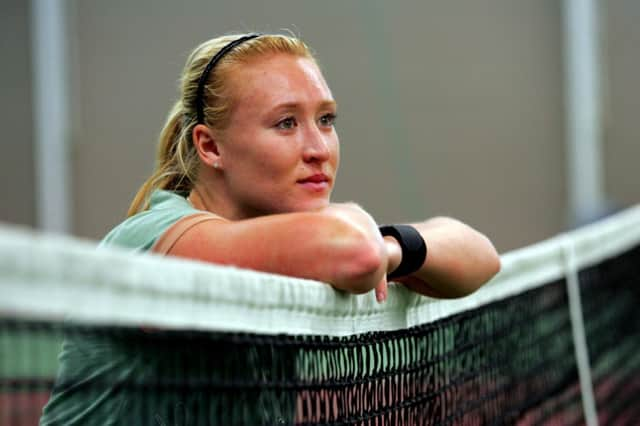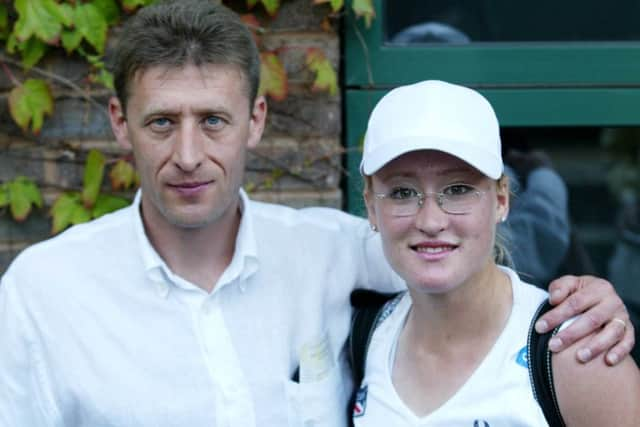Elena Baltacha: Heroine of a dynasty built on love


And while it began in the Ukraine where Sergei snr was a football star, Scotland – and Scottish tarmacadam – became crucial to the tale as his daughter embarked on her great tennis obsession.
In a land of few tennis heroes, many youngsters’ first grapples with a racquet come on a tarmac court. But Elena’s epic matches with her older brother Sergei jnr happened on the road outside their Perth home with the lines marked out in chalk.
Advertisement
Hide AdAdvertisement
Hide Ad“It would start out of the best of three sets and just keep rising,” Elena recalled in 2005, having graduated to the street from garden swingball, when her brother deemed she was ready. “I was so desperate to beat Sergei that every time I lost I’d suggest the best of five, seven, whatever. I’d cheat, threaten to tell tales to my mum, anything. It used to drive me mad but I couldn’t win. I’d have sleepless nights because he was too good for me.”


While their dad was making himself a cult favourite at St Johnstone, these games happened daily, only stopping when it got dark – and, although they were keenly-fought, brother and sister were always close. When they were very young, if Elena was given a sweet, she’d always take an extra one for Sergei jnr. “Sergei was my hero when I was little,” she confirmed. “I couldn’t have made the progress I did without all those hours spent trying to beat him. That’s definitely where I got my competitive edge.”
It is all too poignant looking back over the family story to see how Elena and Sergei jnr, a footballer like their dad, encouraged and inspired each other. By 1999, when Elena was 15, she was thrashing her 19-year-old brother on the courts. “You could always see her potential,” Sergei jnr said. “At first I would beat her because of my strength but that didn’t last long. Then we played at Scotstoun she beat me about 11-1 – she totally embarrassed me!”
By then, the brother was beginning his own journey, having just signed for St Mirren. Sergei jnr, like Sergei snr, was a defender and his father was predicting a great career for him. “My son is better than I was,” said the former Soviet Union captain. “He has natural talent, a great attitude and I am very proud of him. I honestly believe he can go on to play for a big club like Rangers.”
Still, despite his dad’s fine words, Sergei jnr thought his sister was more deserving of them. “She has the potential to be one of the top ten female players in the world,” he said. Then, in 2002, when Elena announced herself at Wimbledon with her second-round win over the seeded Amanda Coetzer, Sergei jnr was planning his trip to London for her next match and talking excitedly of wearing his Buddies strip at the All-England Club, hopefully within sight of royalty.
Sergei jnr once remarked of the Baltacha dynasty: “We must have something in our blood.” It expands further when we remember that Elena’s mother Olga was a talented athlete, held a European pentathlon record at junior level and would have competed in the 1980 Olympics had she not given birth to Sergei jnr.
Sergei snr helped the Soviet Union team win the football bronze medal at the Moscow Games and, two years later in Spain, he was playing against Scotland in the World Cup. The 2-2 draw eliminated us from the tournament on goal difference, with the silky sweeper playing his part with a rare strike in the Soviets’ win over New Zealand. Little did he know that football – and glasnost and perestroika – would eventually bring him and his family to Scotland.
With the all-conquering Dynamo Kiev team of the 1980s, which virtually doubled as the national side, Sergei snr won seven league titles and the European Cup-Winners’ Cup. Then, in 1988, he smashed through the Iron Curtain to become the first Soviet footballer to play for a British club.
Advertisement
Hide AdAdvertisement
Hide AdIt was a Scot who made this happen – John Duncan, the ex-Dundee and Tottenham striker, who was manager of Ipswich Town – and young Elena was startled by the welcome from an army of photographers as the family touched down at Heathrow en route to their new home in Suffolk. “I was only five,” she recalled, “and everything was strange to me. All I can remember is those flashing lights. It’s an image I’ll never forget.”
The children went to an international school. “We were happy in Kiev but we were happy in the UK too,” said Sergei jnr. “There were lots of children learning English at the school and we didn’t feel like outsiders. It was more prosperous here.”
But Elena was initially resistant to change, stubbornly refusing to learn the new language until Olga bribed her with the promise of a new bicycle. “It was a Pink Panther one and I really wanted it,” she said. “So I got the bike and got on with learning English.”
After 18 months, Duncan was replaced as Ipswich manager and, soon after that, the Baltachas were on the move to Perth. Scotland may not share a fiercely-committed, state-driven sporting ideology with the old Soviet Union but Elena busied herself in its gymnastics clubs and its majorettes troupes and, very soon after, its tennis courts. Perth Tennis Club vividly remembers the arrival of the wee girl with big glasses and a baseball cap the wrong way round. She romped through the Scottish age-group championships, winning titles at under-12, 14, 16 and 18.
All through his St Mirren days, Sergei jnr never passed up an opportunity to promote his little sister. “Elena is developing into a top tennis player,” he said in 2001. “When she turns 18 she will have a real chance of making Wimbledon at senior level. I’m sure she’ll make it.” He missed her debut later that year because of football commitments but said: “We’re very close and got on well from an early age. I’m protective of her because I’m her older brother and speak to her every night on the phone to see how she’s doing.”
No one will have been more proud than Elena when Sergei jnr, who declared that Scotland was the only country he wanted to play for, got the chance in 1999 at under-21 level when he became the first without a Scottish bloodline to don the dark blue. The debut came at Firhill against Bosnia where he had to smile blankly through Flower of Scotland. “I don’t know the words,” he said, afterwards, “but then I don’t know the Ukrainian national anthem either.”
Sergei jnr was forced to quit in 2004 at the age of 25 because of a serious back injury. It was at this sad moment that Elena made her remark about her brother being her hero, thanking him for helping turn her into such a gutsy tennis player. There must be no doubt, in view of how her own chapter in this remarkable story has come to such a shattering end, that she is his heroine.
SEE ALSO